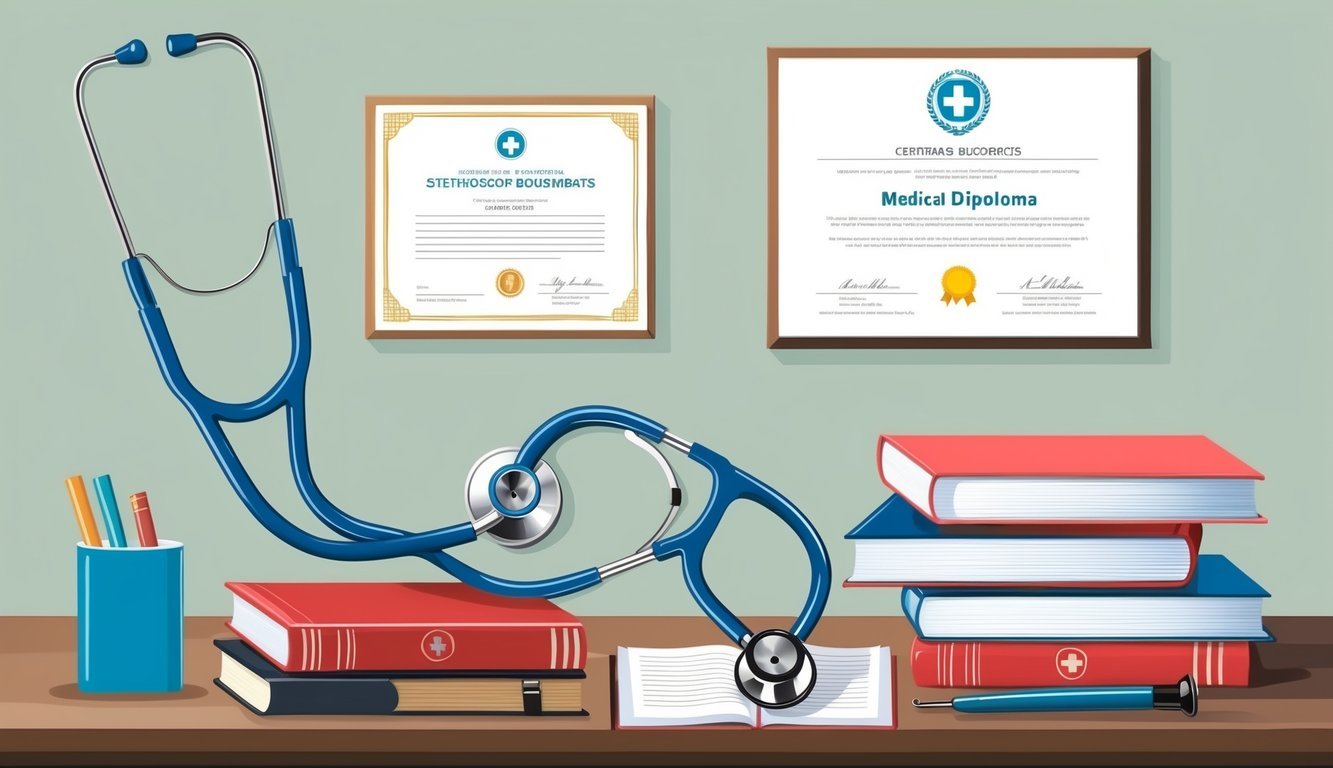Transitioning from a registered nurse (RN) to a physician assistant (PA) can be an appealing career shift for those looking to expand their roles in healthcare.
To make this switch successfully, you must acquire a graduate degree and meet specific licensure requirements.
This pathway not only capitalizes on your existing knowledge and experience but also opens new opportunities for patient care and professional growth.
As an RN, you are already equipped with valuable skills and a strong foundation in patient management.
Pursuing the RN to PA route allows you to build on this background while taking on greater responsibilities in diagnosing and treating patients.
Many find this transition rewarding as it often leads to increased salary potential and diverse specialty options in the medical field.
If you are considering this career switch, understanding the prerequisites for PA programs, such as healthcare experience and academic requirements, is essential.
Check resources like the AAPA for comprehensive information on the steps to take.
Embracing this change could elevate your career and deepen your impact in healthcare.
Understanding the RN to PA Transition
Transitioning from a registered nurse (RN) to a physician assistant (PA) involves a significant shift in responsibilities and education.
It’s essential to grasp the educational pathways and the benefits of your healthcare experience as you make this career switch.
Education Pathways from RN to PA
Typically, the journey from RN to PA requires further education.
Most PA programs are graduate-level and lead to degrees such as a Master’s Degree in PA Studies, Health Science, or Medical Science.
Steps involved include:
-
Prerequisites: Ensure you meet the required prerequisites. Many programs look for prior coursework in subjects like biology, chemistry, and anatomy.
-
Application: Submit applications that often require letters of recommendation, personal statements, and healthcare experience documentation.
-
PA Program: Complete a PA program, which generally spans 24-30 months, combining classroom training in medical concepts and clinical rotations across various specialties.
-
Licensure: After graduation, you must pass the Physician Assistant National Certifying Exam (PANCE) to practice.
Healthcare Experience Benefits
Your background as a registered nurse offers invaluable advantages when transitioning to a PA role.
-
Clinical Skills: You already possess essential clinical skills and patient care experience, making the adjustment to PA responsibilities smoother.
-
Patient Interaction: Your experience in direct patient care helps in understanding patient needs and developing strong communication skills.
-
Teamwork: Familiarity with working in multidisciplinary teams enhances your ability to collaborate effectively as a PA.
-
Specialty Knowledge: If you have experience in specific areas, such as cardiology or emergency care, it can inform your practice as a PA, allowing for increased specialization.
This combination of educational pursuits and leveraging your nursing background can significantly ease your transition into the PA profession.
For more details on PA programs, consider exploring options on platforms that specialize in healthcare careers, such as Nursing Licensure and Different Medical Careers.
Education and Certification Requirements

Transitioning from a registered nurse (RN) to a physician assistant (PA) involves specific educational pathways and certification standards.
Understanding these requirements is crucial for successfully navigating this career change.
From Nursing Licensure to PA Licensure
To become a PA, you first need to hold a valid nursing license, typically achieved through passing the NCLEX examination.
Next, you should pursue a Bachelor of Science in Nursing (BSN) if you haven’t already.
Following this, entering a PA program requires at least a master’s degree in physician assistant studies.
Admission often includes prerequisites such as biological sciences and healthcare experience, which may be assessed through your prior nursing education.
Some programs may also require the Graduate Record Examination (GRE), so check individual program requirements before applying.
PA Programs and Accreditation
PA programs are accredited by the Accreditation Review Commission on Education for the Physician Assistant (ARC-PA).
This ensures the program meets specific educational standards.
A typical PA program lasts 24-30 months and includes both classroom and clinical training components.
Upon completion of your program, you must pass the Physician Assistant National Certifying Exam (PANCE) to gain certification as a PA-C. Preparing for this exam involves thorough review and practice, so consider utilizing study materials and resources available from organizations like the American Academy of Physician Assistants.
Here’s a quick reference table for clarity:
| Requirement | Description |
|---|---|
| Nursing Licensure | Passing the NCLEX |
| Education Path | Obtain a BSN and complete a master’s degree in PA studies |
| Admission Exams | Potential GRE requirement |
| Program Accreditation | Must be ARC-PA accredited |
| Certification Exam | Pass the PANCE for PA-C credentialing |
Licensure and Certification Process

The journey from RN to PA involves understanding the licensure and certification process, which includes passing specific exams and obtaining state licenses. Key components are the certification exams and the steps for state licensure.
Navigating the Certification Exams
As you transition to becoming a Physician Assistant, you must successfully pass the Physician Assistant National Certifying Examination (PANCE).
This exam assesses your medical and clinical knowledge necessary for practice.
Key aspects of the PANCE:
- Eligibility: You need to graduate from an accredited PA program.
- Registration: Register through the National Commission on Certification of Physician Assistants (NCCPA).
- Content: The exam covers a wide range of topics, including pharmacology, pathology, and clinical medicine.
Prepare thoroughly using test-preparation resources and consider joining study groups for collaborative learning.
State Licensing and Endorsement
Once you pass the PANCE, you will need to apply for your state license.
Each state has its own requirements, so familiarize yourself with the specifics of your state’s Board of Nursing.
Important steps to obtain your state license:
-
Application Process: Complete the application typically found on your state’s official Board of Nursing website. You may also need to submit proof of your PANCE scores.
-
Temporary Practice Permit: Some states offer a temporary practice permit while you await your full license, allowing you to start working.
-
Endorsement: If you have prior licensure in another state, you may need to seek endorsement, which involves meeting the state’s requirements for out-of-state applicants.
For a detailed overview of the nursing licensure process, refer to the Nursing Licensure Guide.
Scope of Practice and Clinical Skills

Understanding your scope of practice is crucial as you transition into a nursing role.
This includes a range of clinical skills and responsibilities, particularly in the areas of patient management and core medical procedures.
Core Medical and Diagnostic Procedures
As a registered nurse (RN) in Pennsylvania, you are expected to perform various core medical and diagnostic procedures.
These include conducting physical assessments, obtaining patient histories, and performing diagnostic tests.
You will utilize tools like blood pressure cuffs, stethoscopes, and diagnostic imaging devices to collect vital information.
Other responsibilities may involve ordering and interpreting laboratory results.
Key Procedures
- Conducting physical examinations
- Performing EKGs
- Collecting samples for lab tests
You are trained to recognize abnormal findings and report them to the healthcare team.
This skill set enhances your ability to diagnose and treat patients effectively.
The Role in Patient Management
Your role in patient management encompasses developing and implementing treatment plans tailored to individual needs.
You will collaborate with healthcare professionals to ensure comprehensive care.
This involves assessing patient conditions and adjusting treatment plans accordingly.
Your duties may also include educating patients about their health conditions and medications.
In specialized areas like pediatrics and psychiatry, your approach to patient management may vary significantly.
Responsibilities in Patient Management
- Monitoring patient progress
- Administering medications and treatments
- Providing emotional support to patients and families
Effective communication skills are essential as you interact with both patients and interdisciplinary teams to coordinate care.
Your expertise contributes significantly to the overall healthcare process.
Career Outlook and Opportunities

The career outlook for physician assistants (PAs) shows promising growth and numerous opportunities.
The landscape is shaped by increasing demand for healthcare services and various pathways available for registered nurses (RNs) transitioning to PAs.
Understanding these elements can enhance your career trajectory.
Job Market Trends for PAs
Employment growth for physician assistants is projected to be 28% from 2023 to 2033, as reported by the Bureau of Labor Statistics.
This rate is significantly faster than the average for all occupations, driven by a growing healthcare environment that requires more qualified providers.
The demand for healthcare services continues to rise due to an aging population and increased focus on preventive care.
As an RN, your healthcare experience will be invaluable in making this transition.
Many employers value nurses’ familiarity with patient care and interdisciplinary teamwork, making RNs desirable candidates for PA positions.
Advancement and Specialization Options
Transitioning from RN to PA opens doors for various specializations, enhancing your expertise and marketability. Certified Registered Nurse Practitioners (CRNPs) often pursue similar paths, allowing for collaborative opportunities in diverse medical fields.
A PA master’s degree lets you specialize in areas such as emergency medicine, surgical assistance, or pediatrics.
Additional certifications can further elevate your qualifications.
Participating in RN to PA bridge programs can streamline your journey.
These programs leverage your existing nursing knowledge, allowing you to graduate more quickly and enter the job market with significant skills.

